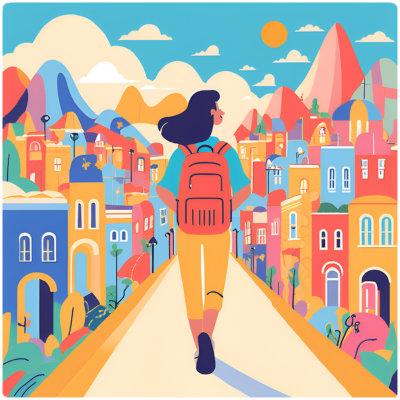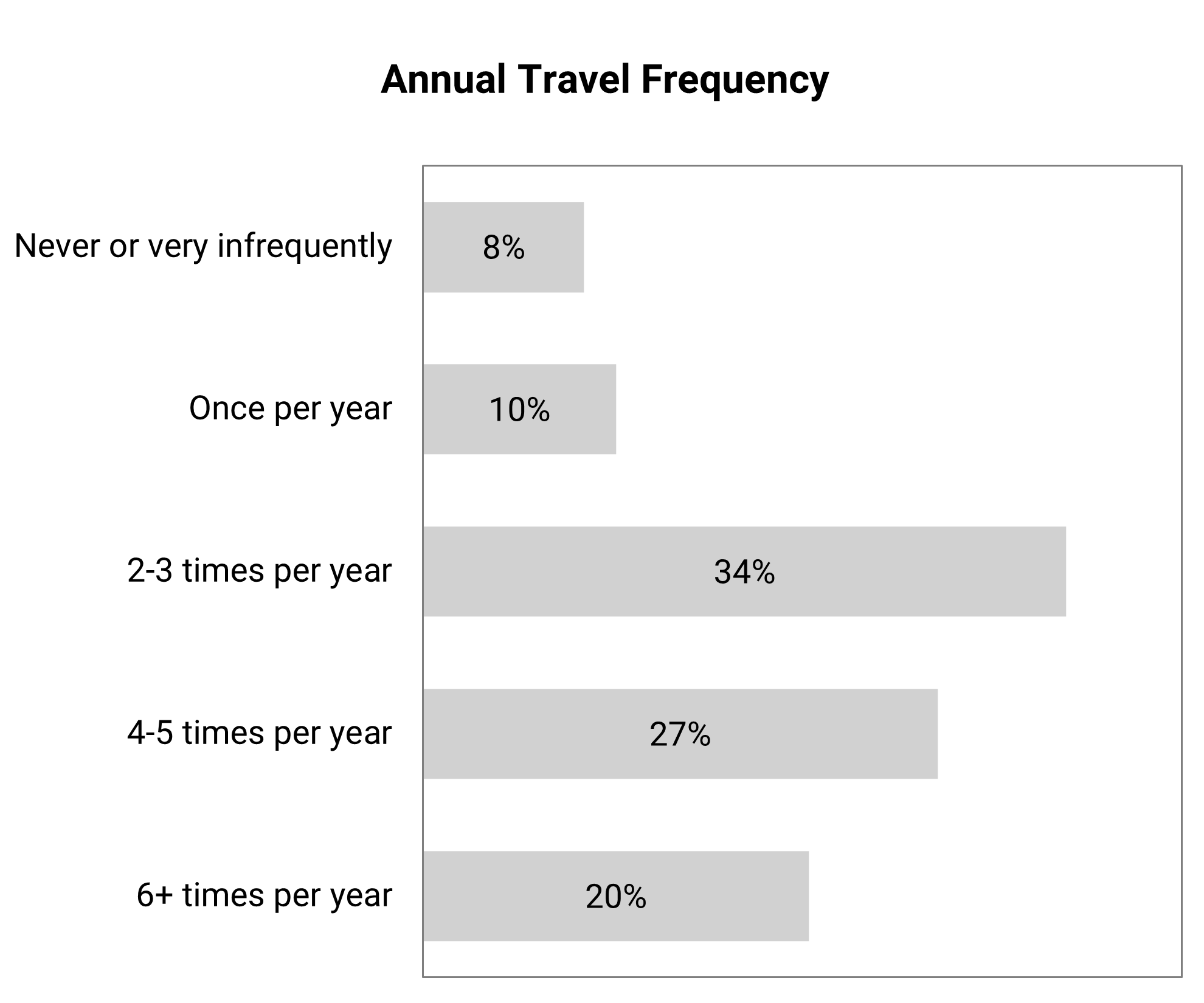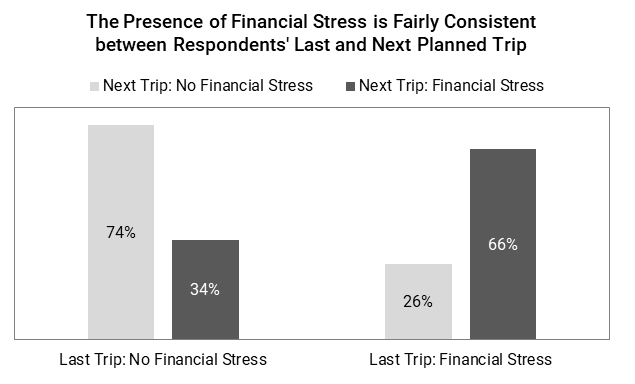How can we better understand and improve travelers’ experiences?
Since the COVID-19 pandemic, the travel industry has made a substantial comeback internationally and within the United States (Mastercard Economics Institute, 2022; U.S. Transportation Security Administration, 2022). As service providers step up to support travelers once again, there is a need to understand emerging needs in a post-pandemic world.
In this study, we examine leisure travel because it involves individuals’ own decisions about spending their money and time. In order to develop a service or product for travelers, we must first understand their desired experience and challenges impeding that experience. Given that leisure travel is meant to be leisurely(!), what aspects of it do travelers find strenuous, stressful, or unexciting that can undermine this real purpose?
Question 1: Why do people travel for leisure?
The reasons for leisure travel are self-motivated, presumably. While it seems obvious, people have different ideas of what is leisurely. What are the reasons behind traveling, and what are they hoping to gain from these experiences?
Question 2: What are the biggest stressors associated with travel?
Traveling is not only about the destination, but the path to getting there—and by ‘path’ I mean the part where you plan, decide, remove your credit card from your wallet, wonder if this is really the best deal, etc. This may be especially true for people traveling for leisure compared to business travelers because the latter typically have many decisions made for them by their employers. Do they see a need for a particular product to help them?
What We Did
I designed a survey to answer these questions. The survey, which you can see here, was distributed using Qualtrics. It typically took participants 15 minutes or less. It included questions about participants’ last travel experience and future leisure travel plans. In particular, it narrowed in on the intention behind their trips and the source of stressors they faced.
Who We Surveyed
I recruited a convenience sample of 59 respondents. The sample included some friends, family, social media connections (e.g., Facebook, LinkedIn), and individuals from survey swap groups (e.g., surveyswap.io, surveycircle.com)
Gender. The study had a predominantly a female sample, with contained 38 female, 19 male, and 2 non-binary/third gender individuals.
Age. Most participants were young adults in the 25–34-year-old range (n = 31) followed by 18–24-year-old range (n = 15). There were seven participants aged 35-44, three participants aged 45-54, one participant aged 55-64, and one participant younger than 18. No one was 65 years old or older.
Income. Over half (54%) of the sample earns less than $50,000 annually, most of whom earn less than $25,000/year (34% of the entire sample). A quarter (24%) earn between $50-100k yearly, and 17% earn over $100,000 annually.
Travel Practices and Behaviors
92% of the sample travels at least once per year on a regular basis, with 81% traveling 2-3 times per year or more. Surprisingly, 20% of the sample travels for leisure 6+ times per year.
The most common reason for traveling for leisure was “Relaxation” at 74% of the sample, followed by “Nature” at 40%, “Family” at 36%, and “Friends” at 34%.
Stressors and Solutions
The stressor most often ranked as the top stressor for respondents’ next trip was finances (29%). This makes sense give that the majority of respondents make less than $50,000 per year.
Most respondents feel strained by finances, even if it wasn't their top stressor. In total, 39 respondents (66% of the sample) said finances contributed to their travel planning stress. Those who reported financial stress on their last trip were more likely to report it again on their next trip—66% of them did so.
How do Travelers Reduce their Stress?
More than half of respondents (33) answered “Not applicable” or “Not sure” to this question. The rest revealed themes:
Preparation and Planning (11)
“Kept an ongoing list of things to pack and kept adding things as they came to mind.”
“Creating back up itineraries if my main plans fell through; planning a bit of flexibility into my schedule.”
“Researched the area online first and stayed in connection with friends and significant other over phone throughout the trip.”
Self-Care and Relaxation (6)
“Listening to music and taking the time as it comes.”
“Try to relax.”
Adapting to Circumstances (4)
“Going with the flow helped.”
“Tried to focus on having fun.”
Seeking Support (3)
“Talk to my family.”
“Talked it through and/or prayed.”
Financial Management (3)
“Saving up money and spending less money the next few months.”
“Use credit card rewards.”
Top Five Takeaways
Stress is Common: While 75% of respondents plan leisure trips to relax, most still experience stress related to at least one aspect of travel.
Lack of Coping Strategies: Almost all respondents reported at least one travel stressor, yet most had no clear strategies for managing it.
Few Solutions for Financial Stress: Although finances are a major stressor for many, only three respondents mentioned any methods for reducing financial-related travel stress.
Financial Stress is Persistent: Those who felt financial stress on previous trips were more likely to report it again on future trips.
Frequent Travel Despite Stress: Travel stress, including financial concerns, doesn't stop most respondents from taking leisure trips. 80% of them travel at least 2-3 times per year.
Remaining Questions
How much do people tend to spend on leisure travel? If people still tend to travel even when it’s a financial strain, what is their upper limit? Would they travel more if it was not as much of a financial strain? How does financial stress affect decisions around where they stay, how far they travel, or the airline they use? Are cited methods effective in reducing financial burden and stress? Do they think the financial strain is worth it for the travel experience?
Are certain demographics prone to travel stress more than others?
Unfortunately, the present research did not obtain a representative sample or sufficient numbers of respondents from various backgrounds in order to answer this question. However, minorities or lower-income individuals may face unique stress and challenges during leisure travel. For example, women may be more concerned with safety when traveling alone or in an unfamiliar place. Those with lower income may have to keep an eye on their spending more than others. A product or service that addresses these unique needs may be needed.








